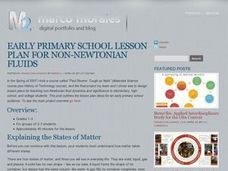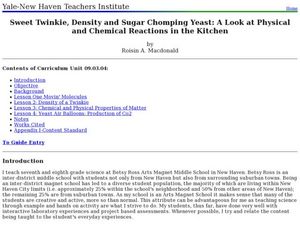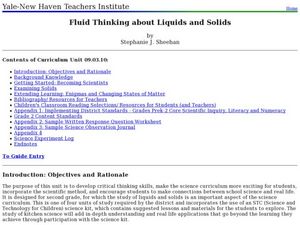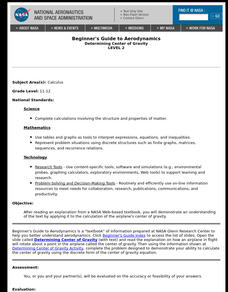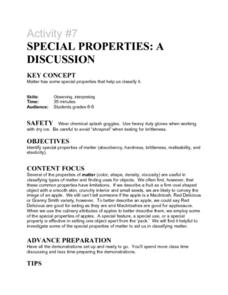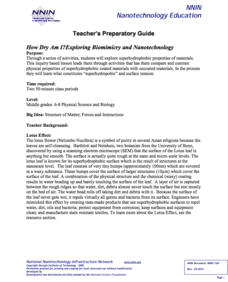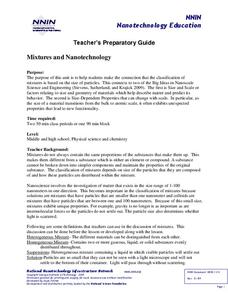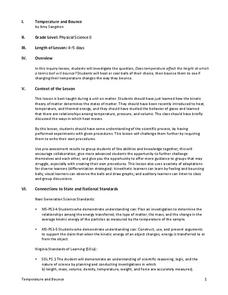Curated OER
Water and Ice
Students perform experiments in pairs to visualize the changes in water during freezing and melting. In this properties of water lesson, students use their senses and inquiry tools to understand the changes in state of water. Suggested...
Curated OER
Non-Newtonian Fluids
Students will use water, cornstarch, eggs, and more to explore the different states of matter. They will make observations of an unknown substance called "Oobleck" and test its liquid and solid properties. This would be a great lesson to...
Curated OER
Sweet Twinkies, Density and Sugar Chomping Yeast: A Look at Physical and Chemical Reactions in the Kitchen
Students investigate matter. In this physical science lesson plan, students will learn about matter, physical states, and reactions. There are a series of four lab activities that will be conducted.
Curated OER
Mixed Review-Chemistry
In this chemistry review activity, students answer a variety of questions about matter, elements, the kinetic theory, chemical and physical properties and the distillation process. They complete a concept map about matter.
Curated OER
Gas Laws and Alka-Seltzer Rockets
Students investigate the Ideal Gas Law. For this three states of matter lesson, students create Alka-Seltzer rockets using film canisters. Students record observations and data according to the scientific method and explain the gas...
Curated OER
The Nature of Chemical Change: Acting Out an Example
Students identify the signs that a chemical reaction took place. In this chemistry lesson, students role play the movement of different molecules of matter. They classify matter according to their properties.
Curated OER
Fluid Thinking About Liquids and Solids
Second graders examine the physical characteristics of the different states of matter. In this chemistry lesson, 2nd graders observe how matter changes from one phase to another. They classify substances according to its type of matter.
Curated OER
The Scientific Method Using Mystery Powders
Young scholars use the scientific method to determine physical and chemical properties of unknown substances. In this scientific method lesson plan, students discuss chemical and physical properties of substances as a class after a...
Curated OER
Effects of Water Pollution on Aquatic Organisms
Students investigate water pollution. They develop an understanding of the behavior of organisms, of the structure and properties of matter, and of natural and human induced hazards by conducting lab tests. They present their data...
Curated OER
Determining Center of Gravity
Young scholars complete calculus calculations involving the structure and properties of matter and determining the center of gravity.
Curated OER
Melting, Freezing, and More!: Phase Transitions
Third graders listen to a talk on phase transitions and view three demonstrations. In this phases of matter lesson, 3rd graders complete a worksheet as they listen about phase transitions. They move through three demonstrations of phase...
Curated OER
Ar.... What Gives?
Learners investigate the properties of air through inflated objects. In this physical science lesson, students examine gas as a state of matter. Student push on inflated objects and note the space the gas has taken up inside. Learners...
Curated OER
Jeopardy 8th Grade (Science)
There are so many topics touched upon in this Jeopardy-style science game, that it is difficult to classify! The categories include electricity, matter, ecology, earth and space, and scientific investigation. This would best be used at...
Curated OER
Activity #7 Special Properties: A Discussion
Young scholars identify special properties of matter (absorbency, hardness, brittleness, malleability, and elasticity). They define the term matter. Pupils investigate some of the special properties of matter to aid in classifying matter.
Curated OER
Matter
Students complete a unit of activities to learn about states of matter and how to measure matter. In this matter lesson, students complete 8 lessons to learn about matter, its states, and how to measure matter.
Curated OER
Carbon: Structure Matters
Students explore the molecular structure of matter and how it can affect the physical characteristics of a specific material. They investigate the role carbon plays in the chemistry of life.
K12 Reader
Elements & Atoms
Study matter in a new way with a cross-curricular assignment for language arts and math. Learners answer five reading comprehension questions after reading a few paragraphs about the periodic table, properties of elements, and how atoms...
National Nanotechnology Infrastructure Network
How Dry am I? Exploring Biomimicry and Nanotechnology
Help your classes feel like they can walk on water! An engaging inquiry-based lesson has young scholars experiment with different surface coatings. They make observations about their properties and how they relate to the surface tension...
National Nanotechnology Infrastructure Network
Mixtures and Nanotechnology
What does size have to do with it? Learners analyze different mixtures, both homogeneous and heterogeneous, to discover the properties related to the size of their particles. The activity connects these properties to those of...
National Nanotechnology Infrastructure Network
Synthesis and Characterization of CdSe Quantum Dots
Does the size of a sample change the physical properties of that substance? It turns out it can! Young scientists combine physics and chemistry to synthesize CdSe quantum dots and record their color properties. Learners should...
Cornell University
Glued into Science—Classifying Polymers
Explore the unique characteristics of polymers. A complete lesson begins with a presentation introducing polymers. Following the presentation, young scientists develop a laboratory plan for creating substances using polymers. They...
STEM for Teachers
Temperature and Bounce
Take part in a fun experiment and hold an impromptu bouncing contest with your class. Young scientists heat and cool balls before bouncing them to determine whether temperature changes affect how they bounce. The set of...
Mr. E. Science
Chemical Reactions
Once I told a chemistry joke, but there was no reaction. Get young chemists involved in changes and reactions with a presentation that begins with physical and chemical changes and chemical reactions. It moves on to chemical...
Agency for Toxic Substances and Disease Registry
Don't Mess with Mercury (Lesson C)
The health effects of mercury exposure if the focus of the first of three activities about the properties of metals. Pairs research mercury to write, prepare, and share posters, articles, or PSAs with the class.



